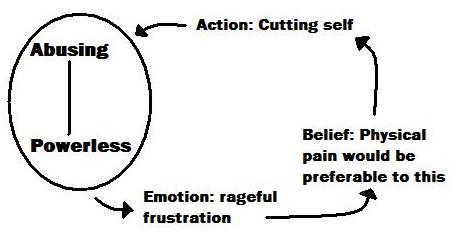Modern psychotherapy utilizes a variety of strategies and techniques but mostly stem from the relationship between a patient and a therapist. 'Talk therapy' much beloved by pop psychology, is an example of a therapist looking for unhealthy patterns or causes of a patient's suffering via how they speak about their lives. Techniques in this kind of psychoanalysis include free association and dream analysis, both cultivated by Sigmund Freud. This approach, however, takes time and psychiatrist rates can be high.
Alternate treatments can be found by looking to behavioral theories in psychology. CBT, cognitive-behavioral therapy, is popular among modern psychologists as it is often faster and therefore cheaper than psychoanalysis. This attempts to tackle faulty thought patterns such as low self-esteem or irrational anxieties by first identifying those patterns or beliefs (the functional analysis stage) and then slowly modifying their behaviors to fix it. For example, someone with a fear of flying may first imagine themselves on a plane, then visit an airport, then make a short flight, etc... so that these gradual steps right the maladaptive cognition. However, there are patients who find even these small steps too challenging.
Conditioning is a final behavioral approach to treating mental illness, often phobias. One useful technique based on classical condition is called 'flooding'[1] in which a patient is exposed to their fear in a relaxed, positive environment which they are unable to exit until they come to associate the fear with positive experiences and the phobia abates or is eliminated. This technique can also be reversed in aversion therapy[1] in which a negative behavior is associated with negative effects, such as an alcoholic taking a drug with their drink that brings on headaches. Here the idea is that the association will discourage the negative behavior. Operant conditioning theories have also given rise to psychological treatments, in methods that rewarding good behavior quickly or make 'behavior contracts' that hold a patient plainly accountable for bad habits.

An example of an undesirable thinking cycle in terms of self-harm. Source: Wikimedia Commons.
The most important thing to remember about modern psychological therapies is that results vary upon the individual and any one, or none of these treatments could work. Some patients respond to a technical application of classical conditioning theory over a period of time and some may simply require one session of hypnosis.
Reference:
1. Kendra Cherry. What is Behavioral Therapy?. [ONLINE] Available at: https://www.verywell.com/what-is-behavioral-therapy-2795998.
© BrainMass Inc. brainmass.com June 29, 2024, 10:47 am ad1c9bdddf